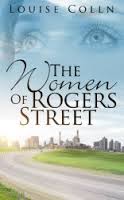Review of The Women of Rogers Street
10/13/15 – Review of Louise Colln’s The Women of Rogers Street
Don’t judge a book by its cover or its title. A blue-eyed woman’s image superimposed on colorful metropolis suggests a story of sunshine and roses, but that is not the story of The Women of Rogers Street. Ms. Colln has crafted an exciting and compelling, multi-themed, character-driven novel, that encompasses human trafficking, class differences, deceit, deception, adultery, and ultimately a journey to self-knowledge, redemption, and finding true love.
metropolis suggests a story of sunshine and roses, but that is not the story of The Women of Rogers Street. Ms. Colln has crafted an exciting and compelling, multi-themed, character-driven novel, that encompasses human trafficking, class differences, deceit, deception, adultery, and ultimately a journey to self-knowledge, redemption, and finding true love.
Della Tyler moves, with her husband, from rural Bethel Branch Valley to the town of Ash Hill as her first step in her pursuit of a singing career. Symbolism abounds in the opening chapter as the reader is introduced to Ash Hill; the town is a character in its own way. Bethel is the biblical location where the Hebrew people first communicated with God, whereas Ash Hill might be named Ash Heap. In this Depression Era story it is a run-down town of boarded-up buildings, soup kitchens and beds for transients, where “block by block the ugliness grew,” a place where, “people drifting along the sidewalk had the same rusted, purposeless look as the buildings.” We see “false fronts used to hide old buildings” that are much like the town’s inhabitants, who also present false fronts to hide their true character.
We meet Della, five-months pregnant, and a soon to be laid-off waitress, angry and bitter over the new life she is carrying within her, and the knowledge that her dream of a singing career will probably not happen. Among the last customers she will be serving this day are John Montgomery and Ira Cranston, the town leaders. Businessman that he is, nothing is more important to John Montgomery than the survival and ultimate economic grown of Ash Hill. Ira Cranston, the town’s banker, is a man of many secrets and many vices. Their wives are a study in contrast; Florence Montgomery is as weak-willed and submissive as her husband is controlling and domineering, while image-conscious Rose Cranston, the town’s matriarch, is about maintaining the social structure, which would crumble if she knew her husband was maintaining a mistress, the prostitute Lorna Moss.
On Rogers Street, where the town’s elite live, a sacrilege is being committed in the eyes of Rose Cranston as Pam and Toney Blake convert a section of their large home into an apartment. The tenants are Della and her husband Mark.
Della seeks employment as a waitress at the Corthaus, the town’s upscale restaurant, where she interviews with the manager, Cort Reed. Aware of Della’s singing skills, Reed offers her a job as the singer in the speakeasy, located in the basement under the restaurant. She accepts and Reed accompanies her on piano as they make beautiful music together.
The story weaves through Prohibition, the Depression, the tepid recovery, and into the looming shadow of World War II, as the characters struggle to survive the slings and arrows that life in those tumultuous times offered.
The Women of Rogers Street is a novel that reminds readers that while times change, the character and motives of people remain the same. This is an excellent story of the many-faceted aspects of human nature.
Michael J. Tucker
Growing up in the cold northern climate of Pittsburgh, PA, and an only child, Mike was often trapped indoors and left to his own devices, where he would create space ships out of cardboard boxes, convert his mother’s ironing board into a horse and put on his Sunday suit and tie and his father’s fedora and become a newspaper reporter or police detective. This experience left him with an unlimited imagination and the ability to write electrifying short stories and novels.
Mike is the author of two critically acclaimed novels, Aquarius Falling and Capricorn’s Collapse. He has also published a collection of short stories entitled, The New Neighbor, and a poetry collection; Your Voice Spoke To My Ear. His poem, The Coyote’s Den, was included in the Civil War Anthology, Filtered Through Time.
He is a judge for the Janice Keck Literary Award, and the moderator of the Williamson County Library Writers’ Critique Group.
Reviewers of Mike’s novels have compared his writing to: Thomas Wolfe’s I Am Charlotte Simmons, and J. D. Salinger’s Catcher in the Rye. Albert Beckus, Professor Emeritus of Literature at Austin Peay University recently wrote of his novels: “They move naturalistically in the American literary tradition of Theodore Dreiser’s An American Tragedy, but with a twist…as found in The Great Gatsby.”
- Web |
- More Posts(22)